CIVIL LAW Lecture 3 Subjects of civil

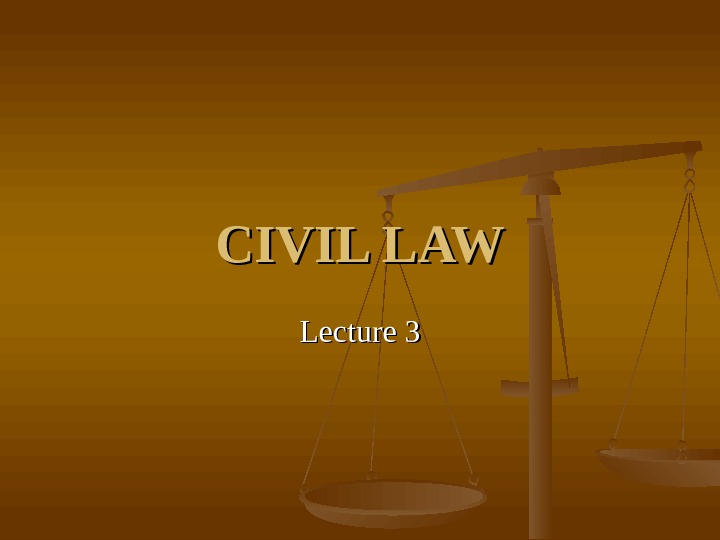
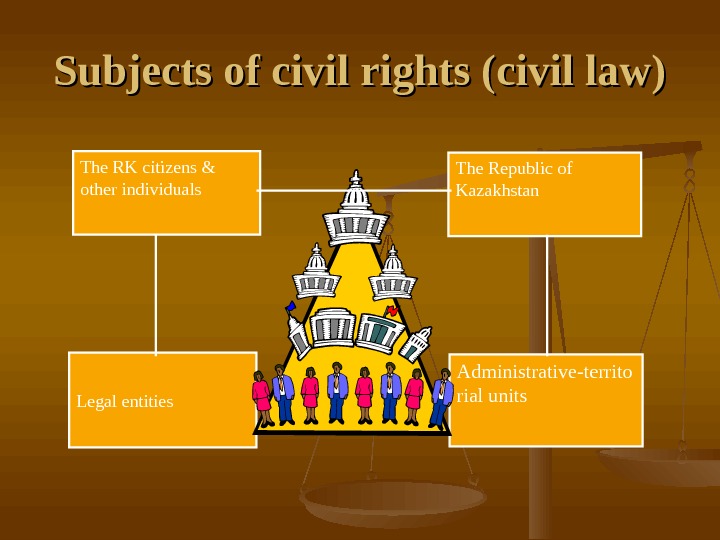
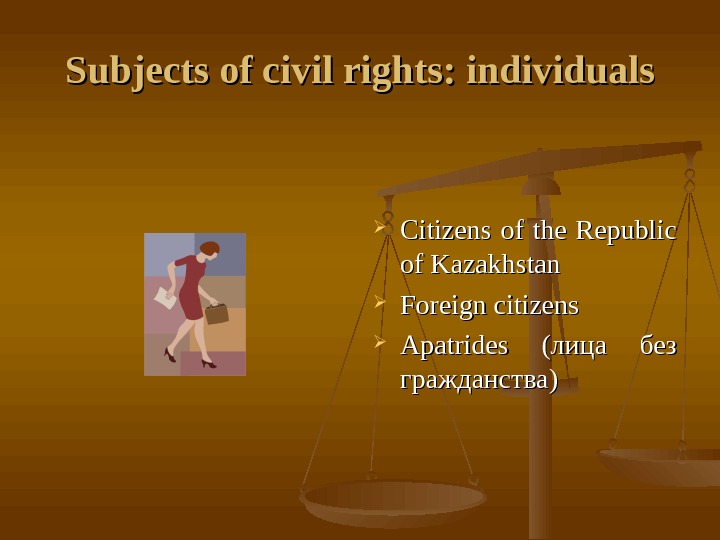
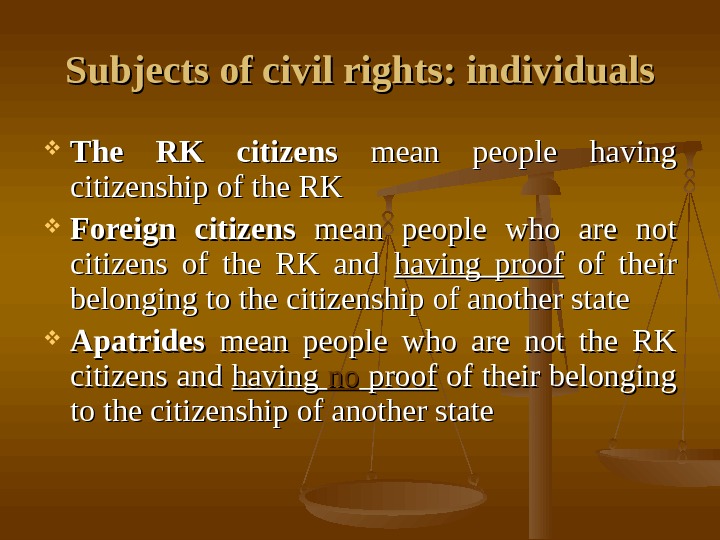
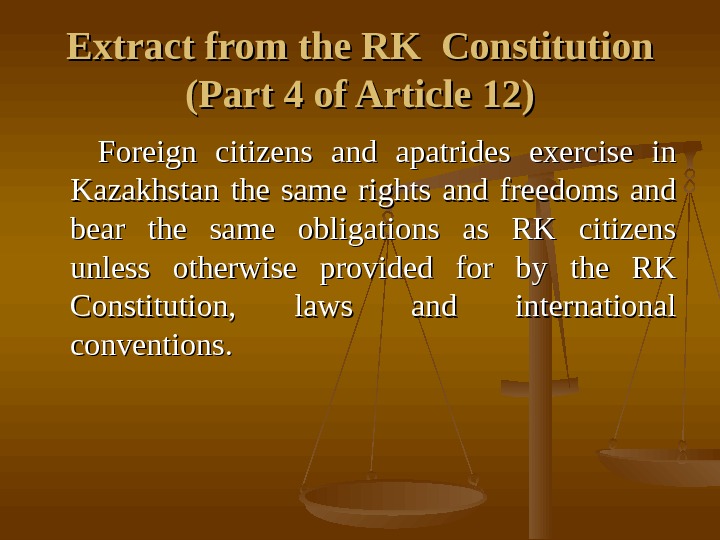
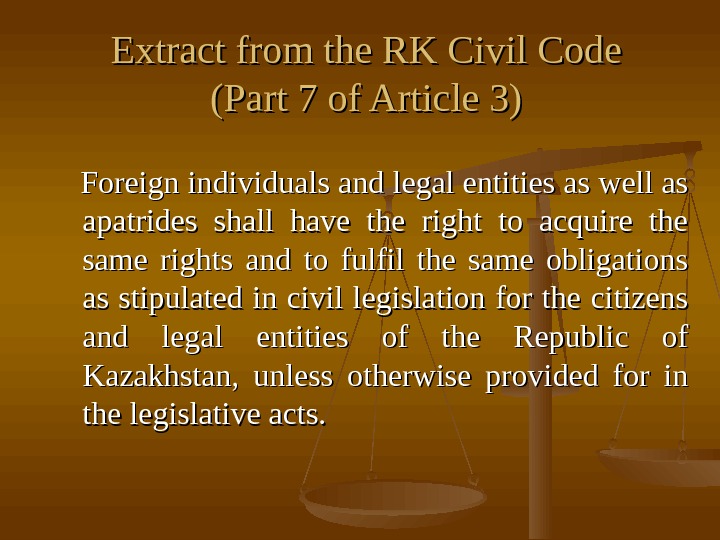
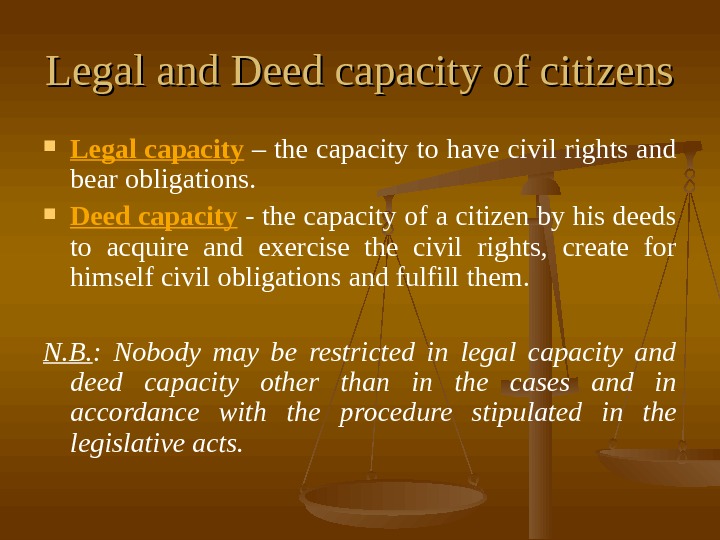
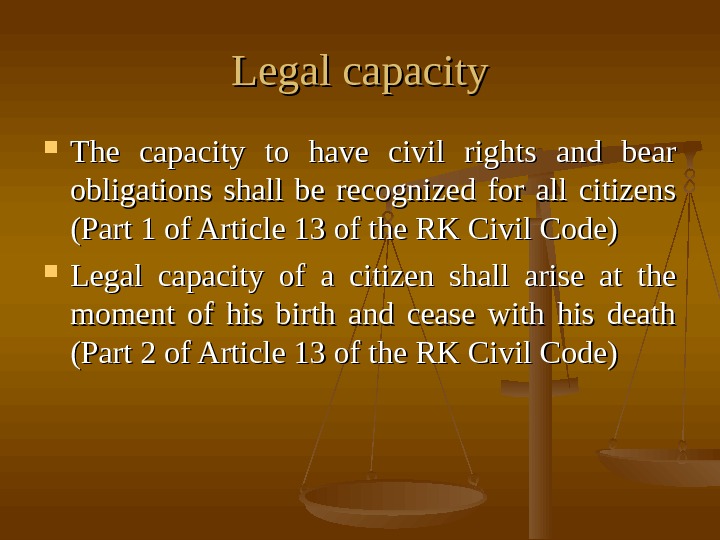
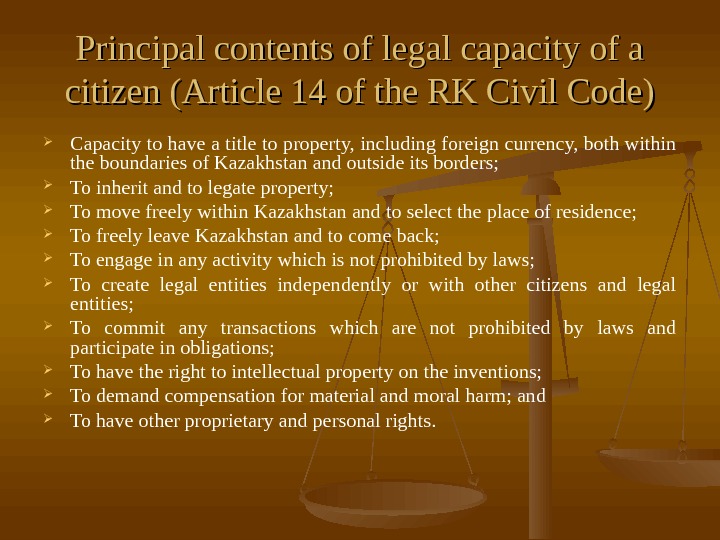
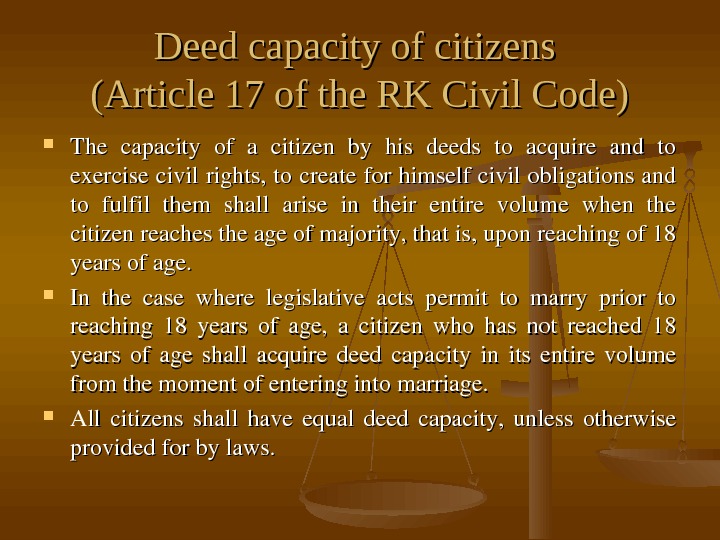
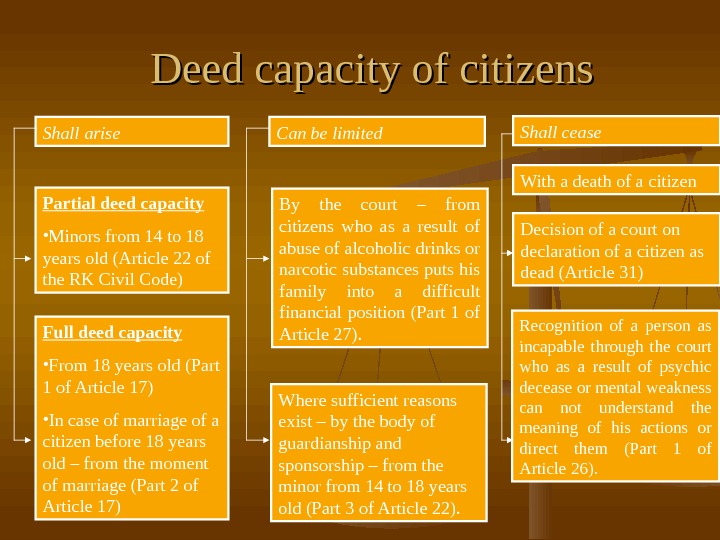
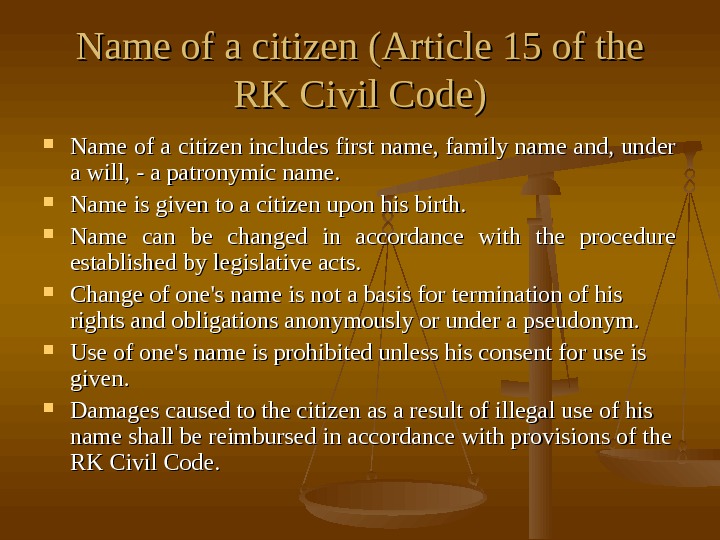
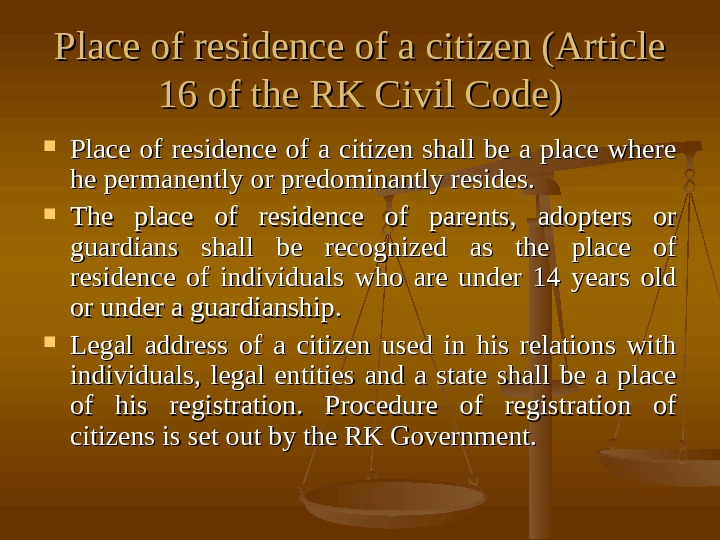
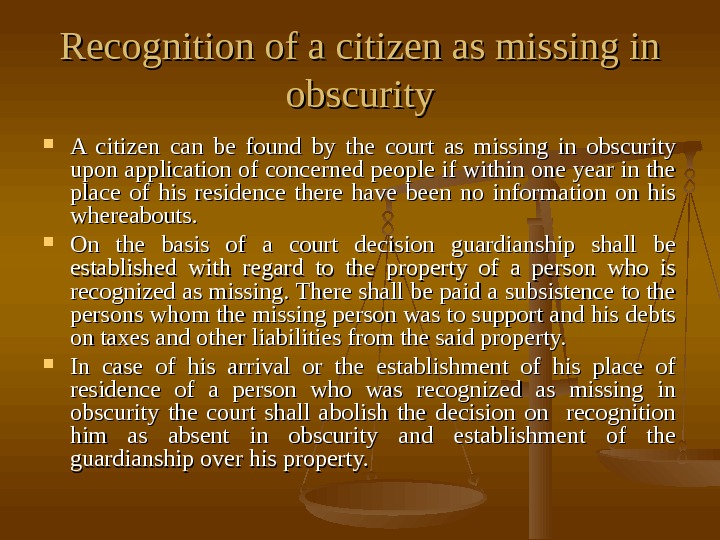
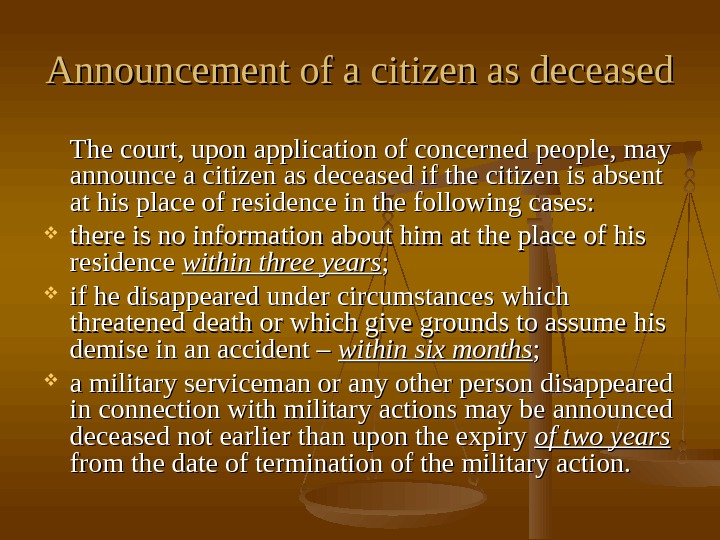
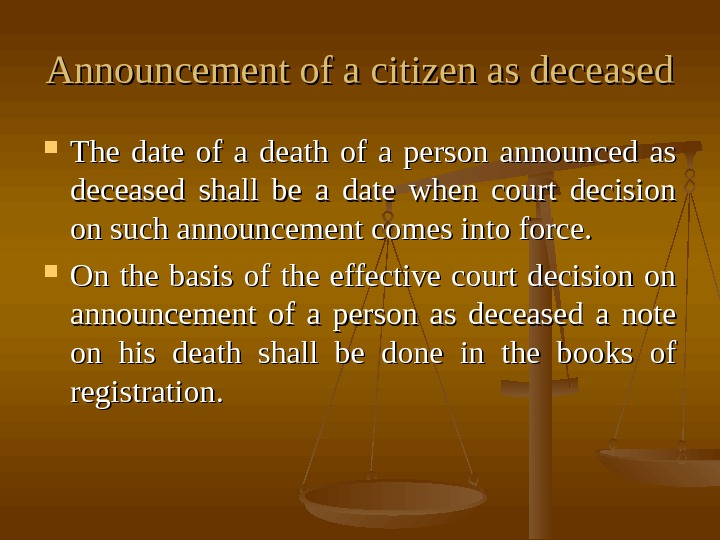
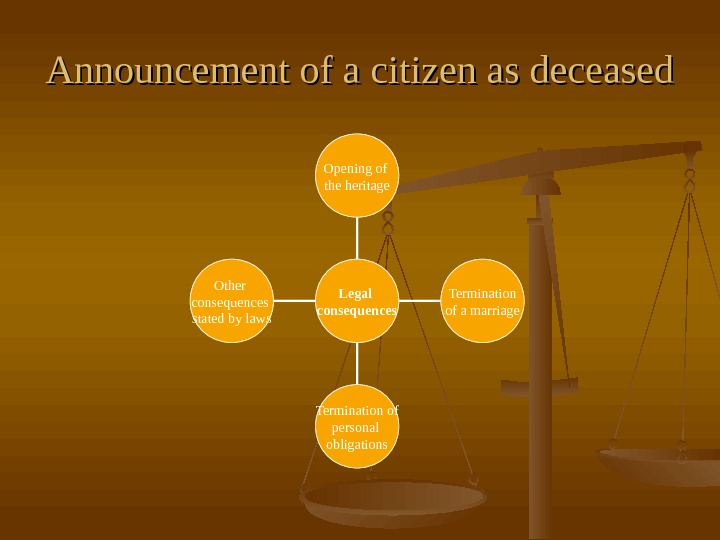
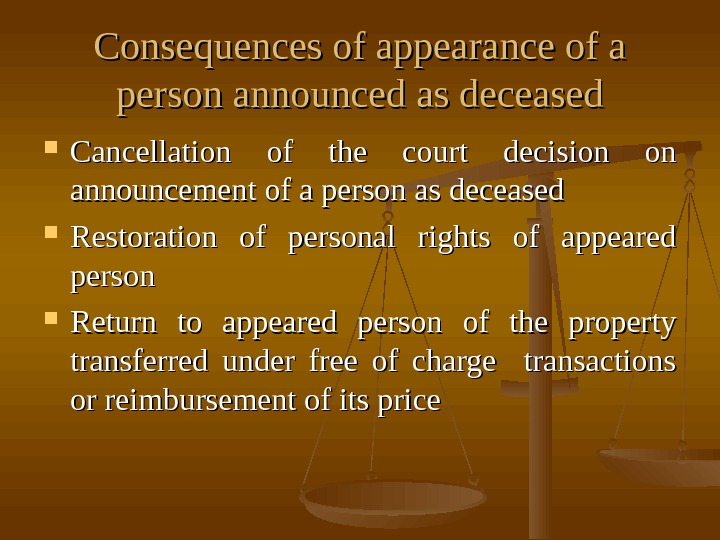
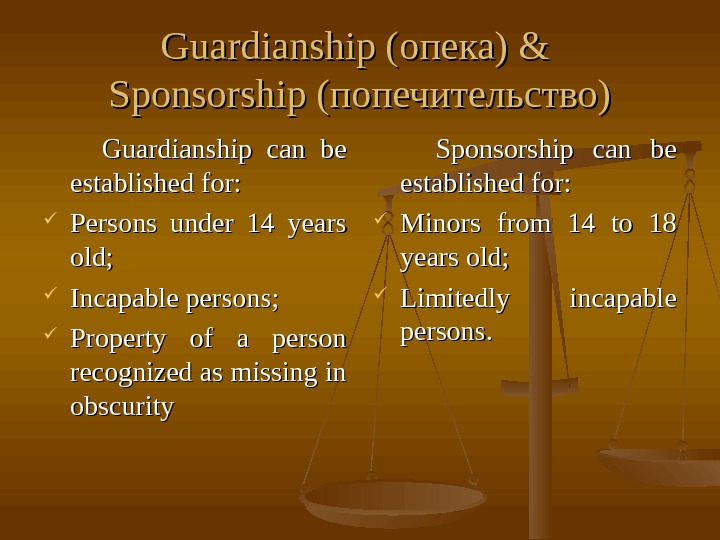
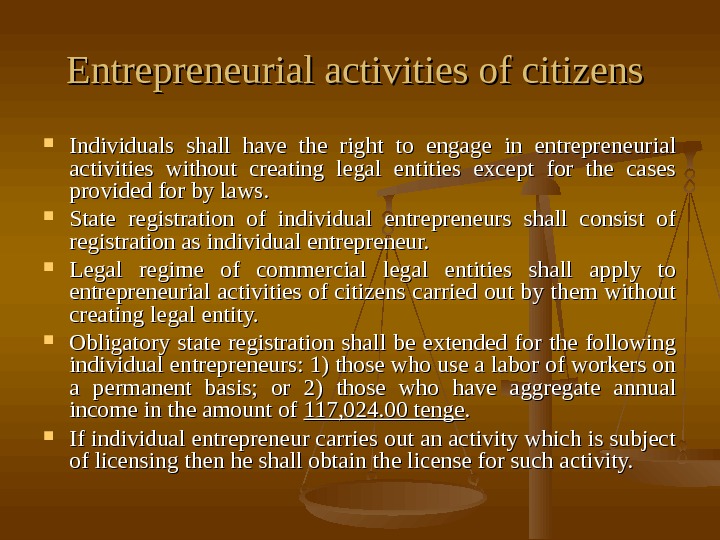
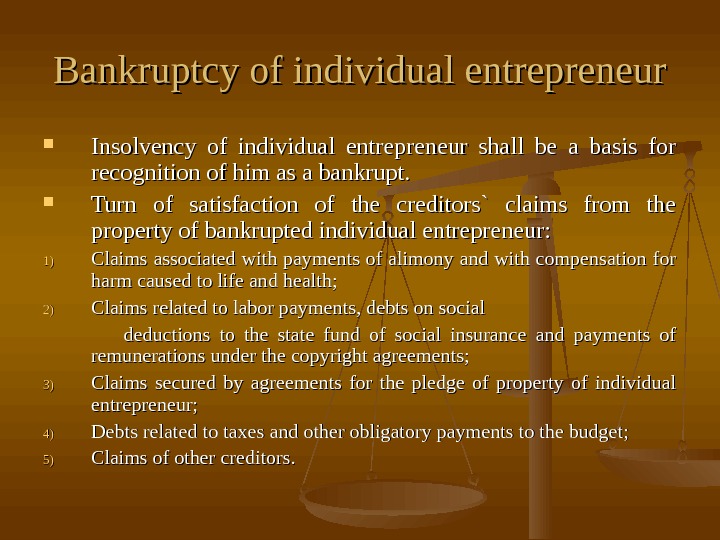
civil_law_subjects_of_civil_rights_lecture_3.ppt
- Размер: 194.5 Кб
- Количество слайдов: 21
Описание презентации CIVIL LAW Lecture 3 Subjects of civil по слайдам
 CIVIL LAW Lecture
CIVIL LAW Lecture
 Subjects of civil rights (civil law) The RK citizens & other individuals The Republic of Kazakhstan Legal entities Administrative-territo rial units
Subjects of civil rights (civil law) The RK citizens & other individuals The Republic of Kazakhstan Legal entities Administrative-territo rial units
 Subjects of civil rights: individuals Citizens of the Republic of Kazakhstan Foreign citizens Apatrides ( лица без гражданства ))
Subjects of civil rights: individuals Citizens of the Republic of Kazakhstan Foreign citizens Apatrides ( лица без гражданства ))
 Subjects of civil rights: individuals The RK citizens mean people having citizenship of the RK Foreign citizens mean people who are not citizens of the RK and having proof of their belonging to the citizenship of another state Apatrides mean people who are not the RK citizens and having nono proof of their belonging to the citizenship of another state
Subjects of civil rights: individuals The RK citizens mean people having citizenship of the RK Foreign citizens mean people who are not citizens of the RK and having proof of their belonging to the citizenship of another state Apatrides mean people who are not the RK citizens and having nono proof of their belonging to the citizenship of another state
 Extract from the RK Constitution (Part 4 of Article 12) Foreign citizens and apatrides exercise in Kazakhstan the same rights and freedoms and bear the same obligations as RK citizens unless otherwise provided for by the RK Constitution, laws and international conventions.
Extract from the RK Constitution (Part 4 of Article 12) Foreign citizens and apatrides exercise in Kazakhstan the same rights and freedoms and bear the same obligations as RK citizens unless otherwise provided for by the RK Constitution, laws and international conventions.
 Extract from the RK Civil Code (Part 7 of Article 3) Foreign individuals and legal entities as well as apatrides shall have the right to acquire the same rights and to fulfil the same obligations as stipulated in civil legislation for the citizens and legal entities of the Republic of Kazakhstan, unless otherwise provided for in the legislative acts.
Extract from the RK Civil Code (Part 7 of Article 3) Foreign individuals and legal entities as well as apatrides shall have the right to acquire the same rights and to fulfil the same obligations as stipulated in civil legislation for the citizens and legal entities of the Republic of Kazakhstan, unless otherwise provided for in the legislative acts.
 Legal and Deed capacity of citizens Legal capacity – the capacity to have civil rights and bear obligations. Deed capacity — the capacity of a citizen by his deeds to acquire and exercise the civil rights, create for himself civil obligations and fulfill them. N. B. : Nobody may be restricted in legal capacity and deed capacity other than in the cases and in accordance with the procedure stipulated in the legislative acts.
Legal and Deed capacity of citizens Legal capacity – the capacity to have civil rights and bear obligations. Deed capacity — the capacity of a citizen by his deeds to acquire and exercise the civil rights, create for himself civil obligations and fulfill them. N. B. : Nobody may be restricted in legal capacity and deed capacity other than in the cases and in accordance with the procedure stipulated in the legislative acts.
 Legal capacity The capacity to have civil rights and bear obligations shall be recognized for all citizens (Part 1 of Article 13 of the RK Civil Code) Legal capacity of a citizen shall arise at the moment of his birth and cease with his death (Part 2 of Article 13 of the RK Civil Code)
Legal capacity The capacity to have civil rights and bear obligations shall be recognized for all citizens (Part 1 of Article 13 of the RK Civil Code) Legal capacity of a citizen shall arise at the moment of his birth and cease with his death (Part 2 of Article 13 of the RK Civil Code)
 Principal contents of legal capacity of a citizen (Article 14 of the RK Civil Code) Capacity to have a title to property, including foreign currency, both within the boundaries of Kazakhstan and outside its borders; To inherit and to legate property; To move freely within Kazakhstan and to select the place of residence; To freely leave Kazakhstan and to come back; To engage in any activity which is not prohibited by laws; To create legal entities independently or with other citizens and legal entities; To commit any transactions which are not prohibited by laws and participate in obligations; To have the right to intellectual property on the inventions; To demand compensation for material and moral harm; and To have other proprietary and personal rights.
Principal contents of legal capacity of a citizen (Article 14 of the RK Civil Code) Capacity to have a title to property, including foreign currency, both within the boundaries of Kazakhstan and outside its borders; To inherit and to legate property; To move freely within Kazakhstan and to select the place of residence; To freely leave Kazakhstan and to come back; To engage in any activity which is not prohibited by laws; To create legal entities independently or with other citizens and legal entities; To commit any transactions which are not prohibited by laws and participate in obligations; To have the right to intellectual property on the inventions; To demand compensation for material and moral harm; and To have other proprietary and personal rights.
 Deed capacity of citizens (Article 17 of the RK Civil Code) The capacity of a citizen by his deeds to acquire and to exercisecivilrights, tocreateforhimselfcivilobligationsand to fulfil them shall arise in their entire volume when the citizenreachestheageofmajority, thatis, uponreachingof 18 yearsofage. In the case where legislative acts permit to marry prior to reaching 18 years of age, a citizen who has not reached 18 years of age shall acquire deed capacity in its entire volume fromthemomentofenteringintomarriage. A ll citizens shall have equal deed capacity, unless otherwise providedforbylaws.
Deed capacity of citizens (Article 17 of the RK Civil Code) The capacity of a citizen by his deeds to acquire and to exercisecivilrights, tocreateforhimselfcivilobligationsand to fulfil them shall arise in their entire volume when the citizenreachestheageofmajority, thatis, uponreachingof 18 yearsofage. In the case where legislative acts permit to marry prior to reaching 18 years of age, a citizen who has not reached 18 years of age shall acquire deed capacity in its entire volume fromthemomentofenteringintomarriage. A ll citizens shall have equal deed capacity, unless otherwise providedforbylaws.
 Deed capacity of citizens Shall arise Can be limited Shall cease Partial deed capacity • Minors from 14 to 18 years old (Article 22 of the RK Civil Code) By the court – from citizens who as a result of abuse of alcoholic drinks or narcotic substances puts his family into a difficult financial position (Part 1 of Article 27). With a death of a citizen Full deed capacity • From 18 years old (Part 1 of Article 17) • In case of marriage of a citizen before 18 years old – from the moment of marriage (Part 2 of Article 17) Where sufficient reasons exist – by the body of guardianship and sponsorship – from the minor from 14 to 18 years old (Part 3 of Article 22). Decision of a court on declaration of a citizen as dead (Article 31) Recognition of a person as incapable through the court who as a result of psychic decease or mental weakness can not understand the meaning of his actions or direct them (Part 1 of Article 26).
Deed capacity of citizens Shall arise Can be limited Shall cease Partial deed capacity • Minors from 14 to 18 years old (Article 22 of the RK Civil Code) By the court – from citizens who as a result of abuse of alcoholic drinks or narcotic substances puts his family into a difficult financial position (Part 1 of Article 27). With a death of a citizen Full deed capacity • From 18 years old (Part 1 of Article 17) • In case of marriage of a citizen before 18 years old – from the moment of marriage (Part 2 of Article 17) Where sufficient reasons exist – by the body of guardianship and sponsorship – from the minor from 14 to 18 years old (Part 3 of Article 22). Decision of a court on declaration of a citizen as dead (Article 31) Recognition of a person as incapable through the court who as a result of psychic decease or mental weakness can not understand the meaning of his actions or direct them (Part 1 of Article 26).
 Name of a citizen (Article 15 of the RK Civil Code) Name of a citizen includes first name, family name and, under a will, — a patronymic name. Name is given to a citizen upon his birth. Name can be changed in accordance with the procedure established by legislative acts. Change of one’s name is not a basis for termination of his rights and obligations anonymously or under a pseudonym. Use of one’s name is prohibited unless his consent for use is given. Damages caused to the citizen as a result of illegal use of his name shall be reimbursed in accordance with provisions of the RK Civil Code.
Name of a citizen (Article 15 of the RK Civil Code) Name of a citizen includes first name, family name and, under a will, — a patronymic name. Name is given to a citizen upon his birth. Name can be changed in accordance with the procedure established by legislative acts. Change of one’s name is not a basis for termination of his rights and obligations anonymously or under a pseudonym. Use of one’s name is prohibited unless his consent for use is given. Damages caused to the citizen as a result of illegal use of his name shall be reimbursed in accordance with provisions of the RK Civil Code.
 Place of residence of a citizen (Article 16 of the RK Civil Code) Place of residence of a citizen shall be a place where he permanently or predominantly resides. The place of residence of parents, adopters or guardians shall be recognized as the place of residence of individuals who are under 14 years old or under a guardianship. Legal address of a citizen used in his relations with individuals, legal entities and a state shall be a place of his registration. Procedure of registration of citizens is set out by the RK Government.
Place of residence of a citizen (Article 16 of the RK Civil Code) Place of residence of a citizen shall be a place where he permanently or predominantly resides. The place of residence of parents, adopters or guardians shall be recognized as the place of residence of individuals who are under 14 years old or under a guardianship. Legal address of a citizen used in his relations with individuals, legal entities and a state shall be a place of his registration. Procedure of registration of citizens is set out by the RK Government.
 Recognition of a citizen as missing in obscurity A citizen can be found by the court as missing in obscurity upon application of concerned people if within one year in the place of his residence there have been no information on his whereabouts. On the basis of a court decision guardianship shall be established with regard to the property of a person who is recognized as missing. There shall be paid a subsistence to the persons whom the missing person was to support and his debts on taxes and other liabilities from the said property. In case of his arrival or the establishment of his place of residence of a person who was recognized as missing in obscurity the court shall abolish the decision on recognition him as absent in obscurity and establishment of the guardianship over his property.
Recognition of a citizen as missing in obscurity A citizen can be found by the court as missing in obscurity upon application of concerned people if within one year in the place of his residence there have been no information on his whereabouts. On the basis of a court decision guardianship shall be established with regard to the property of a person who is recognized as missing. There shall be paid a subsistence to the persons whom the missing person was to support and his debts on taxes and other liabilities from the said property. In case of his arrival or the establishment of his place of residence of a person who was recognized as missing in obscurity the court shall abolish the decision on recognition him as absent in obscurity and establishment of the guardianship over his property.
 Announcement of a citizen as deceased The court, upon application of concerned people, may announce a citizen as deceased if the citizen is absent at his place of residence in the following cases: there is no information about him at the place of his residence within three years ; ; if he disappeared under circumstances which threatened death or which give grounds to assume his demise in an accident – within six months ; ; a military serviceman or any other person disappeared in connection with military actions may be announced deceased not earlier than upon the expiry of two years from the date of termination of the military action.
Announcement of a citizen as deceased The court, upon application of concerned people, may announce a citizen as deceased if the citizen is absent at his place of residence in the following cases: there is no information about him at the place of his residence within three years ; ; if he disappeared under circumstances which threatened death or which give grounds to assume his demise in an accident – within six months ; ; a military serviceman or any other person disappeared in connection with military actions may be announced deceased not earlier than upon the expiry of two years from the date of termination of the military action.
 Announcement of a citizen as deceased The date of a death of a person announced as deceased shall be a date when court decision on such announcement comes into force. On the basis of the effective court decision on announcement of a person as deceased a note on his death shall be done in the books of registration.
Announcement of a citizen as deceased The date of a death of a person announced as deceased shall be a date when court decision on such announcement comes into force. On the basis of the effective court decision on announcement of a person as deceased a note on his death shall be done in the books of registration.
 Announcement of a citizen as deceased Other consequences stated by laws Termination of personal obligations Termination of a marriage. Opening of the heritage Legal consequences
Announcement of a citizen as deceased Other consequences stated by laws Termination of personal obligations Termination of a marriage. Opening of the heritage Legal consequences
 Consequences of appearance of a person announced as deceased Cancellation of the court decision on announcement of a person as deceased Restoration of personal rights of appeared person Return to appeared person of the property transferred under free of charge transactions or reimbursement of its price
Consequences of appearance of a person announced as deceased Cancellation of the court decision on announcement of a person as deceased Restoration of personal rights of appeared person Return to appeared person of the property transferred under free of charge transactions or reimbursement of its price
 Guardianship ( опека) & & Sponsorship (( попечительство) Guardianship can be established for: Persons under 14 years old; Incapable persons; Property of a person recognized as missing in obscurity Sponsorship can be established for: Minors from 14 to 18 years old; Limitedly incapable persons.
Guardianship ( опека) & & Sponsorship (( попечительство) Guardianship can be established for: Persons under 14 years old; Incapable persons; Property of a person recognized as missing in obscurity Sponsorship can be established for: Minors from 14 to 18 years old; Limitedly incapable persons.
 Entrepreneurial activities of citizens Individuals shall have the right to engage in entrepreneurial activities without creating legal entities except for the cases provided for by laws. State registration of individual entrepreneurs shall consist of registration as individual entrepreneur. Legal regime of commercial legal entities shall apply to entrepreneurial activities of citizens carried out by them without creating legal entity. Obligatory state registration shall be extended for the following individual entrepreneurs: 1) those who use a labor of workers on a permanent basis; or 2) those who have aggregate annual income in the amount of 117, 024. 00 tenge. . If individual entrepreneur carries out an activity which is subject of licensing then he shall obtain the license for such activity.
Entrepreneurial activities of citizens Individuals shall have the right to engage in entrepreneurial activities without creating legal entities except for the cases provided for by laws. State registration of individual entrepreneurs shall consist of registration as individual entrepreneur. Legal regime of commercial legal entities shall apply to entrepreneurial activities of citizens carried out by them without creating legal entity. Obligatory state registration shall be extended for the following individual entrepreneurs: 1) those who use a labor of workers on a permanent basis; or 2) those who have aggregate annual income in the amount of 117, 024. 00 tenge. . If individual entrepreneur carries out an activity which is subject of licensing then he shall obtain the license for such activity.
 Bankruptcy of individual entrepreneur Insolvency of individual entrepreneur shall be a basis for recognition of him as a bankrupt. Turn of satisfaction of the creditors` claims from the property of bankrupted individual entrepreneur: 1)1) Claims associated with payments of alimony and with compensation for harm caused to life and health; 2)2) Claims related to labor payments, debts on social deductions to the state fund of social insurance and payments of remunerations under the copyright agreements; 3)3) Claims secured by agreements for the pledge of property of individual entrepreneur; 4)4) Debts related to taxes and other obligatory payments to the budget; 5)5) Claims of other creditors.
Bankruptcy of individual entrepreneur Insolvency of individual entrepreneur shall be a basis for recognition of him as a bankrupt. Turn of satisfaction of the creditors` claims from the property of bankrupted individual entrepreneur: 1)1) Claims associated with payments of alimony and with compensation for harm caused to life and health; 2)2) Claims related to labor payments, debts on social deductions to the state fund of social insurance and payments of remunerations under the copyright agreements; 3)3) Claims secured by agreements for the pledge of property of individual entrepreneur; 4)4) Debts related to taxes and other obligatory payments to the budget; 5)5) Claims of other creditors.

